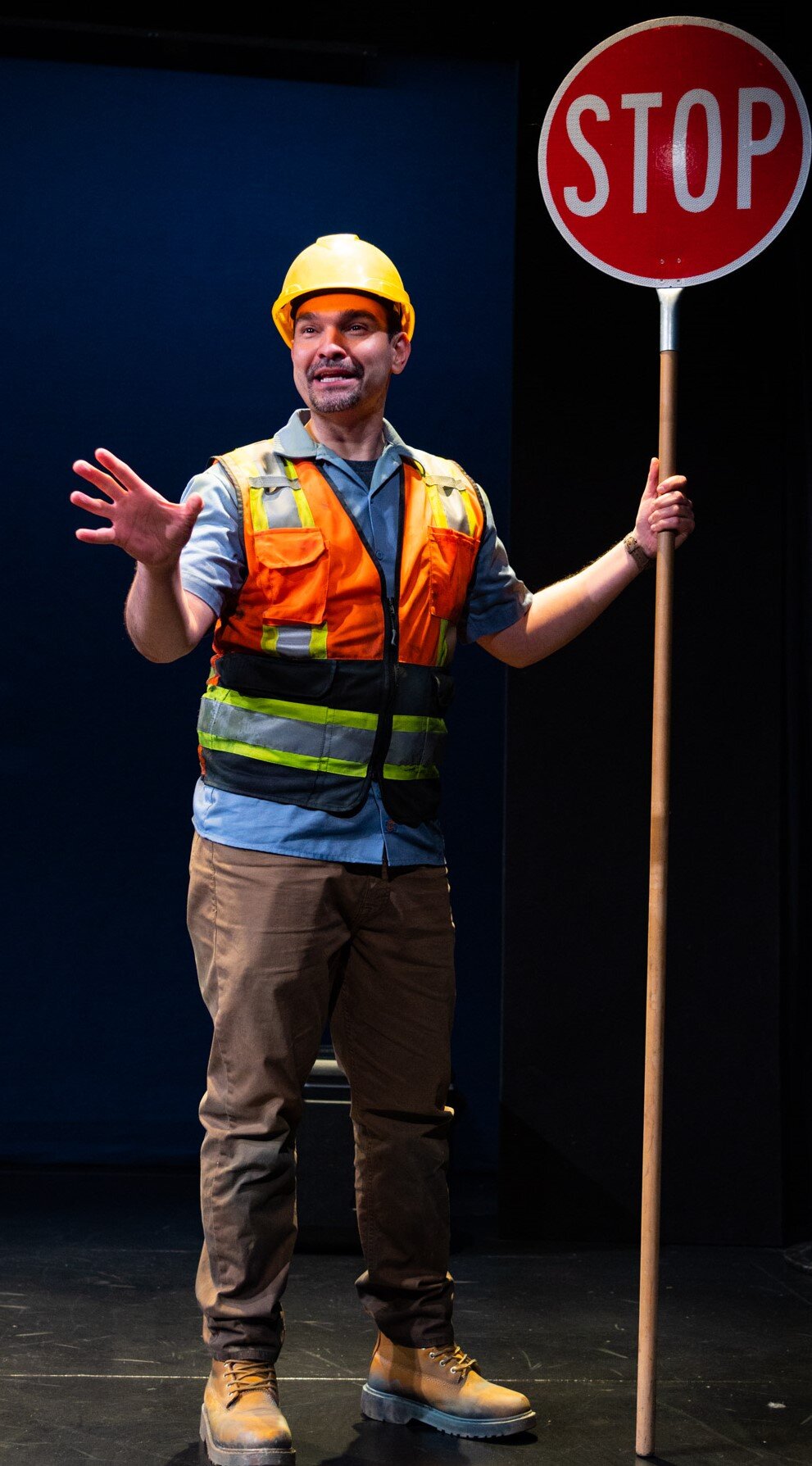The unnamed man in A Sign of the Times, played by Javier Muñoz, calls the traffic sign that keeps him company Fred.
The solo play A Sign of the Times stars Javier Muñoz as a former physics professor who now works as a traffic controller near a construction site. Sounds of vehicles zooming past, slowing down or screeching to a halt are heard frequently, and Muñoz occasionally speaks with their unseen drivers.
In keeping with this traffic theme, I’d say playwright Stephen Lloyd Helper needs to pick a lane. Not only does the Sign of the Times protagonist tell his personal story, he reflects on the concept of time; imagines his own death and wait in Purgatory; gives physics debriefings; quotes Frost, Pope, and Shakespeare; and expounds on—or makes passing reference to—Greek mythology, art deco architecture, Casablanca, Dante, T.S. Eliot, Boson particles, Buddha, Allah, the periodic table, Of Human Bondage, Bach, Xbox, Japan’s Fukushima disaster, Stanley Kubrick, the burning bush and more.
Muñoz’s one-man show is written and directed by Stephen Lloyd Helper. Photographs by Russ Rowland.
It’s a script that could charitably be called overambitious; less charitably, pretentious. In stuffing in so many digressions and name-drops, the monologue loses focus. “Time” is the first word the man speaks, and time is the first subject he ponders. But by the time (oops) he returns to the topic in the final moments, he’s gone off in so many different directions that it hardly seems like his main thought.
If anything seems like his main thought, it would be the 12-year-old son he has lost to cancer. And the rest of his family that he has subsequently lost: needing a fresh start after their boy’s death, the man’s wife moved away with their young daughter. The man (he doesn’t have a name) brings them up frequently, and these memories are vividly and poignantly evoked. It’s a stronger part of the script than all the literary, scientific, and philosophical musings, which are not especially profound or original and are peppered with overcooked quips like “Euripides, that cool iconoclast—I’ve always imagined him a cross between Tom Waits and Jim Carrey.”
The play gets off to a promising start, with a cute bit where Muñoz explains that he doesn’t find his job boring because he appreciates its simple but effective equipment: the pole with a sign attached that says STOP on one side, SLOW on the other. “In a world of infinite choices of how to order coffee, I love its clarity,” he says. “I think we could communicate better if we all had one of these.” He proceeds to demonstrate how useful it could be in various situations, such as for a woman on a date—holding up the SLOW side, then, on second thought, turning it to STOP.
Muñoz, who succeeded Lin-Manuel Miranda in Hamilton, is an asset to this production. He has an affable presence, and his heart is clearly in the role, even when the script leaves him bloviating more than emoting. With a twinkle in his eyes, which simultaneously show sadness, he recalls Robin Williams in his more serious roles. And how nice to hear Muñoz sing, even if it’s only a few bars of “Greensleeves” here and there.
Javier Muñoz’s character in A Sign of the Times has suffered personal and professional losses.
Other sounds play an important part throughout the show. David Van Tieghem’s sound design includes the aforementioned traffic as well as construction noise and, when the man thinks of his family, their voices and sounds from their home. Caitlin Smith Rapoport’s lighting likewise represents both what’s going on around the man—lights coming from vehicles; sun’s brightness depending on the time of day—and what’s going on inside his head, as the lighting changes with his mood. His thoughts are also illustrated by projections, which, while well designed by Kristen Ferguson, are often superfluous.
Also superfluous—or, really, just inappropriate for this particular play—is breaking the fourth wall. The man wouldn’t have an audience out there on the street, but he might voice his thoughts to nobody in particular to pass the time, which is what appears to be the premise of the monologue. So it’s jarring when, 20 or 30 minutes in, he suddenly asks the audience a question. He addresses them directly a couple of more times, but it doesn’t add anything to the show.
A Sign of the Times is directed by its author, Helper. He has more experience as a director than writer (though he did co-create Smokey Joe’s Cafe), so he’s not overextending himself as playwrights typically do by directing their work. But his play would have benefited from another collaborator—an editor.
A Sign of the Times runs through April 4 at Theater 511 at Ars Nova (511 W. 54th St.). Evening performances are at 8 p.m. Thursday through Saturday and 7 p.m. Monday and Tuesday, with additional 7 p.m. Sunday performances on March 8 and 22; matinees are at 3 p.m. every Saturday and Sunday. Tickets are available by calling (212) 352-3101 or (866) 811-4111 or visiting asignofthetimesplay.com.





